The Election Issue
November 2, 2015
Campaign contributions by NYU faculty
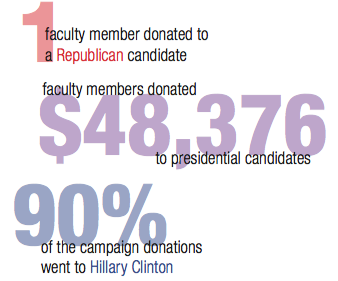
The majority of NYU faculty members’ campaign contributions towards 2016 presidential candidates went to Hillary Clinton, according to public records from the Federal Election Commission.
A WSN analysis of campaign finance records revealed that NYU faculty members have contributed a total of $48,376 to candidates trying to represent their party in next year’s election with 90 percent of the money going to Clinton. The resulting data showed that faculty members lean strongly to the left, perhaps unsurprisingly — Niche.com ranked NYU as the 44th most liberal college in the U.S. out of 880 total.
Only one faculty member donated to a Republican candidate — Jeb Bush received $1,500 from a member of the Forum on Law, Culture & Society at NYU School of Law.
Clinton received the most money from faculty members at $43,626. Bernie Sanders, meanwhile, received just $3,250 over five different contributions. Bush, Clinton and Sanders were the only candidates to receive contributions in the last year.
Lesmah Fraser, an adjunct professor in the School of Professional Studies, donated the most to a candidate, giving $3,950 to Clinton over multiple donations. Meanwhile, some donations from other faculty members went as low as $250.
Contributions were spread out across schools, but only one came from the Tandon School of Engineering, as Jerry Hultin, the former president of the school, donated $2,700 to Clinton. Among the other schools represented in the analysis were the College of Arts and Science; the Stern School of Business; the Robert F. Wagner Graduate School of Public Service; the Steinhardt School of Culture, Education and Human Development; the School of Law and the School
of Medicine.
The data took into account contributions from NYU faculty members who listed either “New York University” or “NYU” as their employer. Additionally, the data compiled only included faculty members who hold a position of instruction or research at the university.
Email Alex Bazeley at [email protected].
Political involvement at NYU
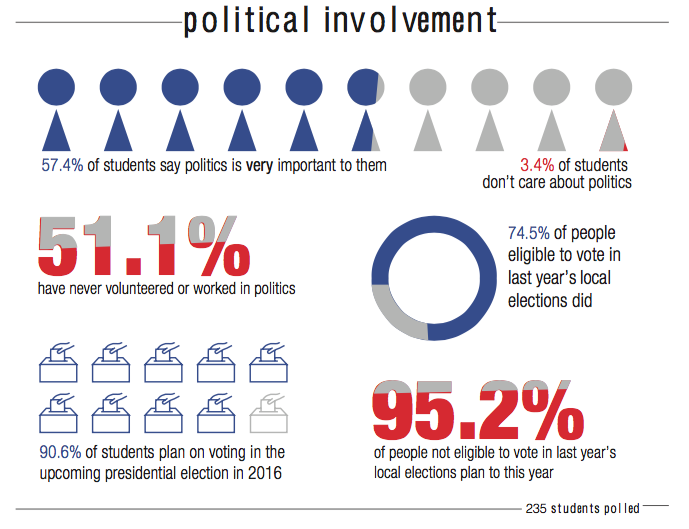
New York state was ranked the second worst in voter turnout during the 2014 election season, according to Times Union. Less than one-third of the state’s eligible population voted. Across the country, only 19.9 percent of 18- to 29-year olds cast ballots, according to Civic Youth. WSN surveyed 235 NYU students about their political involvement in an attempt to determine how politically engaged the student body is.
Of the students surveyed, over half (57.4 percent) say that politics is “very important” to them. Despite this, 90.6 percent said they plan on voting in the upcoming 2016 presidential election. LS sophomore Leah Lavigne said participating in the electoral process enables her to play an active role in politics.
“I definitely plan on voting,” Lavigne said. “I think it’s important to do so because exercising my voice on who is in power in the government is one way I can stand up for what I think is right, wrong, important and in ‘our’ best interest. People are quick to complain, but I think you ought to walk the walk and not just
talk — voting is an obvious way to act on
your opinions.”
Students who are U.S. citizens have the opportunity to vote in New York City by registering under their local address, something many seem eager to do: 95.2 percent of students who weren’t eligible to vote in last year’s local election plan to do so this year.
A majority of the surveyed students say they feel interested and engaged in American politics — only 3.4 percent of students surveyed say they don’t care about politics at all. Tisch sophomore Megan Tomei said the busy lifestyle that comes along with an education at NYU can make it difficult for those interested in politics to keep up.
“I’ll vote, because why not?” Tomei said. “I think it’s a great thing we get to do but that doesn’t mean I necessarily understand how my one vote makes a difference. Because of that, it’s almost a deterrent for me — I haven’t been watching the debates. In a way, though, I want to care more about politics than I do.”
WSN found 74.5 percent of people eligible to vote in last year’s local elections did and 87.1 percent of those ineligible to vote last year have plans to vote in this year’s local election. With over 40 clubs at NYU focusing on politics, public policy, activism or advocacy and provide students with a forum to circulate their political ideas.
The NYU Politics Society, for example, provides a forum for students to share and develop their beliefs. A non-partisan political club at NYU, the group fosters discussion that doesn’t strictly adhere to
any party.
Upon joining the club two years ago, NYU Politics Society Events Director and CAS senior Matthew Glaser was not as certain of his political stance as he is now, but the society helped him learn where his political opinions fell. Many other politically geared clubs at NYU prompt students to think about what drives them to the polls.
Glaser said casting his ballot every November is one of the most powerful rights granted to American citizens, reiterating how important he feels it is to vote.
“You effectively have a say in who is going to represent you in government, and NYU students, I believe, are motivated to get to the polls, to uphold what they believe in, and to not let anyone stop them,” Glaser said. “That is a great part
of democracy.
Email Grace Halio at [email protected].
Where candidates stand on our concerns

Hillary Clinton
Hillary Clinton supports raising the federal minimum wage to $12, and endorses worker organization for higher wages. Clinton is working to pass the Paycheck Fairness Act to reduce workplace discrimination based on gender and has fought for paid family leave.
She endorses background checks to reduce gun trafficking and condones making straw purchasing, or illegal firearm purchasing, a federal crime. Clinton supports reform of existing gun legislation to prohibit those who suffer with mental illness from purchasing a gun.
Her New College Compact policy would eliminate the need for students to take out loans for public colleges and would make community colleges tuition free. The plan requires students and family members to pay what they can within their means and would be funded by limited tax expenditures for high-income taxpayers.
Clinton’s climate change policy aims to install 500 million solar panels across the nation and to generate enough renewable energy to power every home in 10 years. Clinton opposes the Keystone XL pipeline, stating the environmental impact of its construction would outweigh its benefits.
Clinton’s tax plan would give tax cuts to middle class families and small businesses. The proposal additionally calls for raising tax rates on capital gains. Clinton also supports enacting the “Buffett Rule,” named after Warren Buffett, to ensure the wealthy pay taxes to fund her New College
Compact plan.
Donald Trump
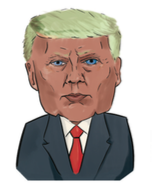
Donald Trump has not released an economic policy to address wages, but he vows to create jobs if he becomes president. Trump supports keeping the federal minimum wage at $7.25 an hour and argues that raising the minimum wage would increase the number of jobs outsourced from the U.S.
His campaign strongly supports Second Amendment rights, affirming that law-abiding citizens should have the freedom to carry any firearm of their choice. Trump also advocates for background checks regarding updated criminal and mental
health records.
Trump has not publicly announced his stance on higher education. He does, however, support cutting funds from the U.S. Department of Education for grades K-12.
In regards to climate change, Trump has gone on record stating it was “a hoax.” Trump supports the construction of the Keystone XL pipeline and has stated the United States should take full advantage of drilling its own oil.
Trump proposes a revenue neutral tax plan, aimed at relieving the burden on middle class families and stimulating economic growth. His platform creates a simpler tax code with four brackets and states no business will pay more than 15% of its income
in taxes.
Bernie Sanders
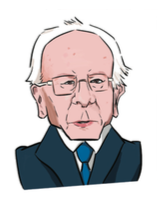 Bernie Sanders fiercely supports increasing the federal minimum wage, with a plan to nationally raise it to $15 by 2020. If elected, Sanders will sign the Paycheck Fairness Act in an attempt to decrease the gender wage gap by reinforcing the The Equal Pay Act.
Bernie Sanders fiercely supports increasing the federal minimum wage, with a plan to nationally raise it to $15 by 2020. If elected, Sanders will sign the Paycheck Fairness Act in an attempt to decrease the gender wage gap by reinforcing the The Equal Pay Act.
When it comes to gun control, Sanders advocates for universal background checks and banning assault weapons. However, Sanders voted against the Brady Bill gun-control act, stating he opposed the inclusion of a mandatory five-day waiting period for gun purchases.
Sanders advocates for tuition-free public colleges. His plan for higher education calls for cutting student loan interest rates and increasing need-based financial aid and work study programs.
A key aspect in Sanders’ campaign is transforming our energy system away from polluting fossil fuels and toward energy efficient and sustainable sources. He also voted against the approval of the Keystone XL pipeline.
His tax plan includes raising taxes for the top 1 percent as well as enacting a tax on Wall Street speculators, much of which will fund his plan to make higher education more affordable.
Sanders also favors a progressive estate tax on multi-millionaires and billionaires to reduce wealth inequality.
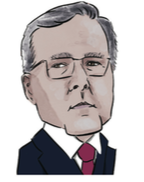
Jeb Bush
Jeb Bush opposes raising the federal minimum wage, stating it should be determined by individual states. Bush has not announced a policy to address the gender wage gap.
Bush supports expanding gun owners’ rights and increasing the number of concealed-carry permits. As governor, Bush enacted the “Stand Your Ground” law to allow Floridians touse guns in self defense. He also signed pro-hunting laws into action during his time as governor.
Bush supports decreasing the cost of attending university domestically and internationally.
Bush supports the Keystone XL pipeline, stating its approval would increase GDP by over $3 billion and would support 42,000 jobs during its construction. Bush believes believes the potential domestic energy source will lead to higher wages, lower gas prices and smaller electricity bills.
Goals for tax reform include simplifying the tax code by reconstructing its brackets and eliminating its loopholes. Bush’s plan would cut taxes for most individual taxpayers and businesses to foster U.S. job creation.
Email Lexi Faunce at [email protected].

